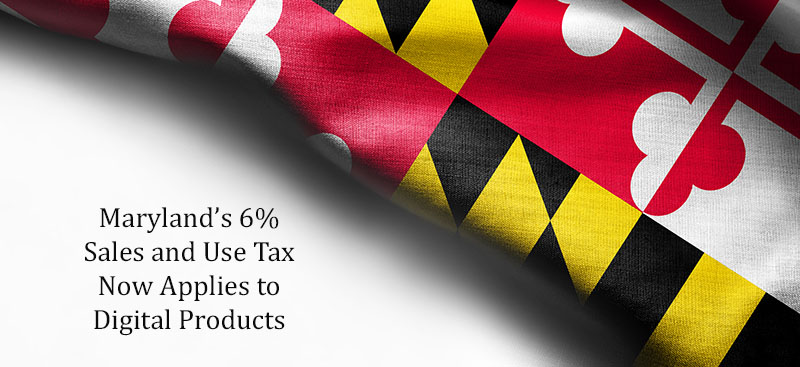March 15th, 2021
Tax Alert: “Digital Products” Now Taxable in Maryland
Posted in: Featured Tax Law Tagged: Jeremy M. Vaida
Author: Jeremy M. Vaida

As of March 14, 2021, Maryland undertakes the greatest expansion of its 6% Sales and Use Tax since its enactment by extending the tax to the sale of all “digital products.” Hoping to shore up the continued erosion of its sales and use base in the face of an increasingly digital economy, this expansion effects the sale of virtually every conceivable digital product on the market today.
Since the tech boom in the 90s, Silicon Valley, and America’s tech sector more broadly, has largely received a pass from federal and state oversight, regulation, and taxation. Meanwhile, the digital economy has continued to cannibalize traditional brick and mortar establishments. Now, 30 years later, the grace period appears to be over.
Maryland’s sales and use tax is now set to be imposed on any “product that is obtained electronically by the buyer … through the use of technology having electrical, digital, magnetic, wireless, optical, electromagnetic, or similar capabilities.” In effect, essentially all commonly understood digital goods, such as:
- Netflix subscriptions;
- Streaming services on Spotify;
- Monthly access to Microsoft Office, Adobe, etc.;
- New York Times online;
- Sirius XM satellite radio;
- Extra lives in Candy Crush;
- Different skins in Fortnite;
- Zoom Pro;
- Audiobooks on Audible;
- Video game purchases for your phone, console, or computer;
- Extra storage on your iCloud;
- Online classes;
- Continuing education videos;
- Invitations to birthdays, weddings, etc. sent online;
- And many more.
In addition to these everyday items, many small businesses may find themselves in the crosshairs, including:
- Software developers;
- Website designers;
- Photographers and videographers;
- Graphic designers;
- 3D Modelers; and
- Any business that provides its finished product electronically.
Critically, Maryland views this change as an expansion to its existing Sales and Use Tax regime. As a result, to the extent businesses engage in an otherwise non-taxable service (lawyers, accountants, psychotherapists, consultants, etc.), they will not have to collect sales tax simply because they provide reports or other work-product in an electronic format. However, to be exempt from the tax, such work-product must remain “inconsequential” to the provision of the service itself.
Maryland has the power to force even out-of-state vendors to collect and remit this new tax, even if they do not have a physical presence in Maryland, due to the U.S. Supreme Court’s recent opinion in South Dakota v. Wayfair, Inc. Specifically, so long as out of state vendors gross at least $100,000 from Marylanders, or engage in 200 individual transactions, they will have to comply with the new law.
As of today, Maryland joins the ranks of 28 other states that have passed some form of digital products tax, though its particular variant is amongst the nation’s most expansive. While it will certainly be unwelcome to many businesses both within and out of the state, it will begin to bring greater parity between the digital and the “traditional” economy.




